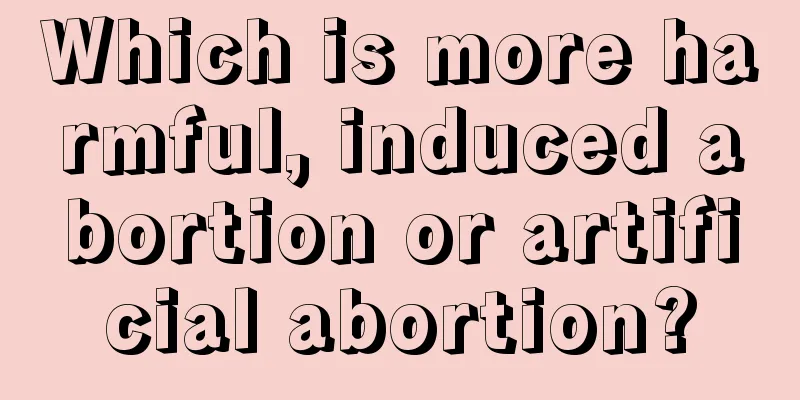Which is more harmful, induced abortion or artificial abortion?

|
Nowadays, there are many ways of abortion. When people decide to have an abortion, they can perform the abortion operation according to their specific circumstances. Abortion and induced labor are two common methods of abortion. Many people want to know which is more harmful, abortion or miscarriage. In fact, the harm of induced abortion is even greater, so if you find that you are unexpectedly pregnant and don’t want it, it is best to have an abortion as soon as possible! 1. Which is more harmful, induced abortion or artificial abortion? Induced abortion causes greater harm. Abortion is a way to end a pregnancy in the early stages of pregnancy, while induced abortion is a way to end a pregnancy in the middle and late stages of pregnancy. The harm in the later stages is definitely greater than that in the early stages, so if you do not plan to continue the pregnancy, you should end the pregnancy as soon as possible. In the case of miscarriage, the pregnancy period is shorter and the fetus is not yet formed, so the harm to the body is relatively small; induced labor refers to a pregnancy of more than three months, when the fetus is relatively complete. Such an operation is more dangerous and is not good for future fertility. To put it more professionally, artificial abortion is the act of artificially ending a pregnancy within three months of pregnancy, and induced labor is the act of artificially ending a pregnancy after three months of pregnancy. 2. The harm of induced labor 1. Postpartum hemorrhage During an induced abortion, the recipient may experience heavy bleeding. This is mainly caused by placenta previa or partial detachment after induced labor, uterine atony, coagulation dysfunction, etc. 2. Birth canal injury Birth canal damage is also one of the hazards of induced labor. This is mainly because the fetus is large during induced labor, and the uterus must exert a lot of effort to expel it from the body through contraction. Once this force exceeds what the uterus can withstand, the chances of damage to the birth canal or uterus are very high. 3. Uterine infection Induced abortion surgery may cause infection in the uterine cavity of the person undergoing the procedure, which is caused by a variety of reasons, such as incomplete disinfection of surgical instruments and improper surgical operation. At the same time, after the operation, the person undergoing induced labor will have a small amount of vaginal bleeding. At this time, care measures should be taken to prevent bacteria from entering the vagina and causing infection. 4. Amniotic fluid embolism After a woman becomes pregnant, the cervical canal will expand more and more. The cervical opening is larger at this time, and the blood vessels are also in a relatively open state. Once strong uterine contractions occur, the intrauterine pressure of the labor induced will increase, rupturing the fetal membrane. Some of the amniotic fluid will take the opportunity to enter the dilated blood vessels, causing amniotic fluid embolism. 3. The harm of abortion 1. Cervical damage caused during artificial abortion can easily lead to habitual abortion and premature birth during subsequent pregnancy. 2. The endometrium and myometrium are damaged during artificial abortion, leading to placental dysfunction after each pregnancy, seriously affecting fetal development and making stillbirth and premature birth more likely to occur. 3. If infection occurs after miscarriage, it will cause inflammation of the reproductive system, and in severe cases it will lead to infertility. 4. If you become pregnant again after artificial abortion and curettage, postpartum hemorrhage is likely to occur due to placental blood circulation disorders. 5. It can easily lead to heavy bleeding and cause severe anemia. 6. The uterus of the aborted woman is fragile. If the doctor is not careful during the abortion operation, the uterus may be torn or perforated, which may be life-threatening in severe cases. 7. It causes multiple artificial interruptions of pregnancy, leading to a series of abnormal physiological and psychological changes, such as abnormal menstruation, neurasthenia, etc. |
<<: Does smoking have any effect after abortion?
>>: Is abortion serious after 50 days?
Recommend
Is it easier to lose weight if you don’t eat rice or noodles for dinner?
Rice and flour are staple foods, and their main i...
What are the benefits of salmon floss? How to make salmon floss
Salmon can effectively prevent the occurrence and...
What causes white hair on the vulva?
As we all know, people often have white hair. In ...
[Medical Q&A] How to diagnose autism early?
Author: Chen Yanni, Chief Physician, Children'...
How to buy fresh marine fish? Is it good for your health to eat marine fish regularly?
Marine fish are edible fish that live in the sea,...
Is it easy to get pregnant with adenomyosis?
The uterus is a female-specific organ and is also...
Brown discharge after using methocloazole suppository
If a woman has dark red secretions after using me...
How many types of female sterilization surgeries are there?
Female sterilization is actually a method of cont...
Is 9 weeks of pregnancy the peak period for morning sickness?
Women experience great pain during the 10 months ...
What is the reason why I am always unclean after my period?
Many girls have this feeling, that is, even after...
Does leep knife surgery affect fertility?
The leep knife surgery is a convenient, fast and ...
Two periods a month
Female menstruation refers to the menstrual perio...
Can long periods of sitting and falling lead to death? Huaxi doctors: Beware of the silent killer of the body - pulmonary embolism
Is this also the case with you in life? =========...
What to do if you have pregnancy syndrome
Pregnancy is the most important event in a woman&...
Can soaking your feet in winter really help you stay healthy?
When the cold winter comes, we are exhausted phys...









